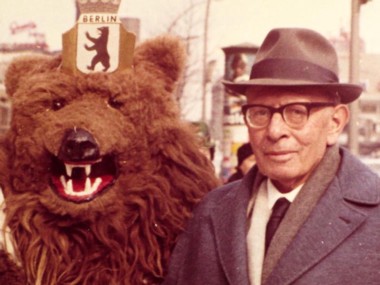Family is a strange thing. Until we begin to build our own brood—and sometimes after that—there is rarely anyone who knows us as well as our parents do, however we might try to keep them distanced from our teenaged selves. And yet, despite living together under a shared roof for 20 years or so, the reverse is never quite so true. In the end, it is often the parents, and not the teenagers, whose lives are the real mystery.
Never has it seemed so mysterious as it does in Arnon Goldfinger’s new documentary The Flat, screening at Amherst Cinema. The award-winning Israeli film began as something exceedingly commonplace—Goldfinger’s 98-year-old grandmother had passed away, and it was left to him and his family to clean out the Tel Aviv apartment she and her husband had occupied since escaping Nazi Germany in the 1930s.
That usual admixture of curiosity, boredom, and remembrance—the lot of anyone going through the accumulated life of a loved one—was quickly spiked with a startling discovery among Gerda Tuchler’s belongings. There the Goldfingers found not only Nazi-era coins—with a swastika on one face and the Star of David on the other—but a stack of propaganda papers, one of which bore a tantalizing headline: “A Nazi Travels to Palestine.” It told the story of Nazi official Leopold Von Mildenstein, who, together with his wife, visited the Holy Land alongside a pair of German Zionists—Goldfinger’s grandparents Gerda and Kurt Tuchler.
With that discovery, the Tuchler house takes on a new air as Goldfinger finds himself questioning just how much he knows about his grandmother. “When I was a kid, we’d sit and chat over apfelstrudel and Swiss chocolate,” Goldfinger says as he recalls the distinctly German air of the Tuchler’s Tel Aviv flat—a once-quaint quirk of his grandmother that now seems somehow suspect, called into question by world history.
The truth is smaller, but more complicated in its own way than the larger conflict of World War II, and infinitely more human. It wouldn’t be fair to share all the details, but it is enough to say that the friendships the Tuchlers made before the war began outlasted—or, perhaps more accurately, ignored—the horrors of those years. If such a friendship seems unthinkable to modern viewers, Goldfinger’s film does a good job of probing how good we humans are at compartmentalizing our messier emotions when put into unimaginable situations. It’s also another reminder that, however much we think we know about the Holocaust era, there are still stories out there, waiting to surprise us.
Also this week: This year’s election cycle brought a lot of disappointment for climate-change activists. Hardly mentioned during the debates, what is arguably our greatest threat—not just to national security, but to our global health—continues to be given short shrift in the political arena. Chasing Ice hopes to change that by presenting remarkable evidence of the real-world changes brought on by our runaway industrial policies. Directed by Jeff Orlowski, it tells the story of acclaimed environmental photographer James Balog, who in 2005 traveled to the Arctic on assignment for National Geographic to tell the story, in photos, of our planet’s changing climate.
The trip changed him, and Balog—who had been something of a skeptic about the effects of climate change—spent the next few years recording time-lapse footage of the destruction of our natural world, compressing long stretches of time into seconds, and allowing us to see the true effects of our continuing state of denial: immense mountains of ancient ice, withering away before our eyes.•
Jack Brown can be reached at cinemadope@gmail.com.



